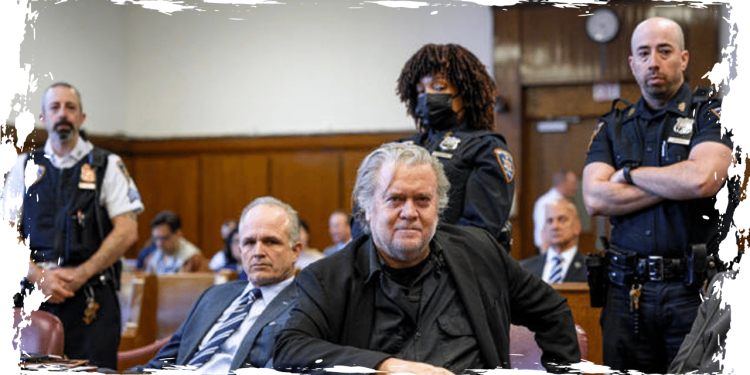A federal court in Washington, D.C., ordered Trump ally Steve Bannon to report to prison by July 1, granting the Justice Department’s request that Bannon serve his four-month prison sentence while he appeals his conviction.
Judge Carl Nichols revoked Bannon’s bond on Thursday, saying he could “no longer conclude that [Bannon’s] appeal raises substantial questions of law,” following a three-judge appeals court panel upholding Bannon’s contempt of Congress conviction.
The ruling and timeframe offer Bannon’s attorneys about a month to challenge the revocation of his bail in higher courts. The defense team also plans to appeal his conviction to the entire D.C. Circuit Court of Appeals.
Bannon’s legal team opposed the Justice Department’s request to proceed with the jail sentence, arguing that its pursuit of further legal review—pperhaps all the way to the Supreme Court—jjustified a further delay in serving his prison sentence to gather advice from other courts.
A jury found Bannon guilty of two counts of contempt of Congress in 2022 for his refusal to comply with a subpoena from the House Select Committee, which was investigating the Capitol attack on January 6, 2021. The congressional investigators were looking into Bannon’s actions in over a dozen critical areas, including his communications with outgoing President Donald Trump as he opposed the results of the 2020 presidential election.
At the time, Bannon said he did not comply due to executive privilege concerns raised by Trump, and that his former attorney recommended he not reply to the subpoena due to the probable privilege.
Before the trial, Nichols, a Trump appointment, instructed Bannon not to tell the jury about his counsel’s advice due to binding precedent that defined intentional default on a subpoena. After Bannon’s conviction, the judge sentenced him to four months in prison without actually imposing the verdict, citing the likelihood of its overturn.
Bannon’s defense then appealed the conviction.
Last month, an appeals court disagreed with his reasoning, ruling that Bannon’s “‘advice of counsel’ defense is no defense at all.” The three-judge panel of the D.C. Circuit Court of Appeals unanimously upheld the jury’s conviction, stating that the defense he sought was “unavailable under this statute.”
The judges noted in an opinion last month that “nothing in the authorities Bannon relies upon calls into question this court’s longstanding interpretation of ‘willfully’ as requiring a deliberate, intentional failure to respond to a subpoena.”
Nonetheless, the panel ruled that its verdict would not take effect until seven days after Bannon filed another appeal, giving another court the option to postpone the prison sentence.
But the Justice Department returned the matter to Nichols’ court and urged the judge to withdraw the stay on Bannon’s four-month prison sentence. Prosecutors asserted that the upholding of the verdict eliminated any “substantial question of law.”
Speaking in court Thursday, prosecutor Jonathan Crabb claimed that the three-judge panel provided a “full-throated” validation of the legal precedent used during Bannon’s jury trial, and as a result, there was “no longer a substantial question before the court.”
The sides agreed that Nichols had the jurisdiction to rule on Bannon’s bail, despite the fact that the appeals court had yet to return the mandate to Nichols’ courtroom, but they agreed on little else.
“The harm caused would be truly irreparable and unjust if the judgment, which has already been fully executed, is then reversed on further review,” stated attorney David Schoen in court papers. “There is no basis for considering removing the stay of the sentence pending appeal until the appeals process has fully run its course.”
Schoen argued on Thursday that Bannon would serve his sentence in prison before any further review of the verdict could take place.
He stated that the entire D.C. Circuit Court of Appeals or the Supreme Court should decide this case because it raises serious constitutional issues.
Nichols, on the other hand, disagreed, claiming that the logic behind his earlier decision to delay Bannon’s prison sentence was no longer valid because of the appeals court’s ruling. He ordered Bannon to self-surrender by July 1, prompting audible displeasure from his legal team in the courtroom.
The House committee on January 6 found Bannon and other Trump White House members guilty of disobeying a subpoena. Former trade advisor Peter Navarro is receiving a four-month prison sentence after a Washington, D.C., jury found him guilty of contempt.
Like Bannon, Navarro is appealing his conviction, but the judge in his case chose not to postpone the imposition of the prison sentence, a decision affirmed by higher courts.
Bannon was not in the White House during the final months of Trump’s presidency, which were of interest to the Jan. 6 committee, but he continues to wield power inside the former president’s political base. Following Trump’s conviction on New York State charges last week, Bannon pushed for retaliation if Trump, the probable Republican presidential nominee, retakes the White House.
Speaking outside of court on Thursday, Bannon stated, “This is about shutting down the MAGA movement, grassroots conservatives, and President Trump.”
“There is not a prison or jail built that will ever shut me up,” he stated, emphasizing that they want to appeal his case to the Supreme Court for review.










